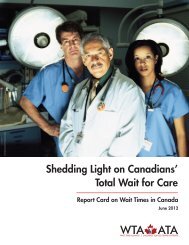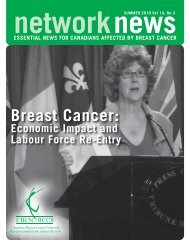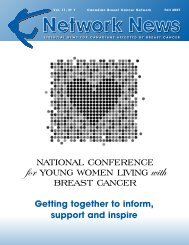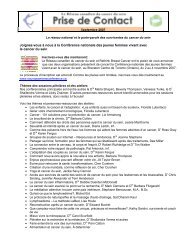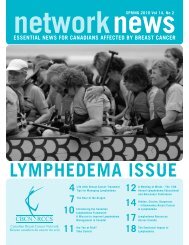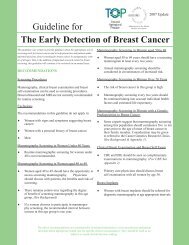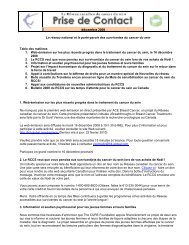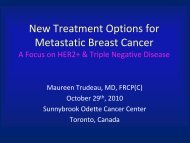Network News - Winter/Spring 2010 - Canadian Breast Cancer ...
Network News - Winter/Spring 2010 - Canadian Breast Cancer ...
Network News - Winter/Spring 2010 - Canadian Breast Cancer ...
You also want an ePaper? Increase the reach of your titles
YUMPU automatically turns print PDFs into web optimized ePapers that Google loves.
Knowledge is Power<br />
Interview with Jane Jankovic<br />
By Ovarian <strong>Cancer</strong> Canada<br />
Jane Jankovic “couldn’t roll up<br />
her sleeve fast enough” to get<br />
a blood test that would tell her<br />
if she was genetically predisposed<br />
to ovarian cancer – the disease that<br />
claimed the lives of her mother and<br />
grandmother.<br />
Yet once she learned – on 9/11 – that<br />
she carries a genetic mutation of the<br />
BRCA1 gene, it took the television<br />
producer two years to decide on a<br />
prophylactic oophorectomy – surgical<br />
removal of the ovaries and fallopian<br />
tubes in a bid to prevent ovarian<br />
cancer.<br />
Despite the fact that her lifetime risk of<br />
developing the disease was as high as<br />
40% and she was also at high risk for<br />
developing breast cancer, it took time<br />
for her to decide on a course of action.<br />
“I was playing the odds,” says Jane.<br />
Part of the delay involved coming to<br />
terms with not having children. She<br />
also didn’t want to be thrown into<br />
menopause at age 41.<br />
When she did opt for surgery, what<br />
she considered a tactical preventive<br />
move may have actually saved her life.<br />
After several analyses of her tissue,<br />
pathologists found Stage II serous<br />
ovarian cancer.<br />
“I didn’t feel anger. I didn’t feel scared.<br />
I felt relief,” recalls Jane. “I had lived<br />
with the threat of cancer for so many<br />
years that being able to focus on the<br />
enemy seemed simpler than living in<br />
fear of an ambush. Now that I knew I<br />
had it, I could focus.<br />
“In ovarian cancer, the cancer’s biggest<br />
advantage is that you don’t know it’s<br />
there until it’s too late. I was Stage<br />
II. And I knew it was there. The<br />
advantage was mine.”<br />
Within a week, Jane began<br />
chemotherapy followed by radiation<br />
therapy that was part of a clinical trial.<br />
That was in 2004 and Jane has been<br />
well ever since. She continues to be<br />
monitored for recurrence and screened<br />
for breast cancer.<br />
Jane Jankovic<br />
Women who are diagnosed with<br />
early-stage ovarian cancer and treated<br />
have survival rates as high as 80% to<br />
90%. Unfortunately, due to a lack of<br />
a screening test for the disease, most<br />
women are diagnosed in the late<br />
stages when survival rates can be as<br />
low as 20%.<br />
Jane is grateful for genetic counselling<br />
and testing – something that was not<br />
available when her grandmother and<br />
mother were alive. The BRCA1 and<br />
BRCA2 genes were identified in the<br />
mid-1990s after both of these women<br />
had died. When genetic counselling<br />
and testing were available in the new<br />
millennium, Jane took advantage of<br />
these advances.<br />
“I didn’t have to think about doing the<br />
test at all,” she says. “I was not one<br />
of those people who was squeamish<br />
about knowing. I wanted to know so I<br />
could then make an informed decision<br />
about what I could potentially do to<br />
improve my chances of not getting<br />
ovarian cancer. For me, it was all winwin<br />
to know.”<br />
While she appreciates the fact that<br />
testing may not be for everybody,<br />
Jane is a person who “wants all of<br />
the information all of the time. I<br />
think it’s one thing to be afraid of<br />
having a genetic predisposition if<br />
there’s nothing you can do with<br />
that knowledge. But being tested for<br />
BRCA1 or 2 does give you an option to<br />
be preventative as much as possible.”<br />
Jane recently celebrated her 50 th<br />
birthday and over the years she has<br />
learned hard lessons about life and<br />
death, especially that “there are no<br />
guarantees.”<br />
Not only has she lost her mother and<br />
grandmother to ovarian cancer, but<br />
her father died of a heart attack weeks<br />
after receiving a clean bill of health<br />
from his cardiologist. “And my sister<br />
went to emergency with chest pains<br />
and was diagnosed with flu. She died<br />
from heart failure the next day.”<br />
Despite these experiences, Jane<br />
remains grateful for the advances that<br />
have allowed her to make decisions<br />
that keep her healthy and active. She<br />
encourages those who are eligible for<br />
genetic counselling to take advantage<br />
of it so they can decide whether or not<br />
to be tested.<br />
“This experience taught me that I can’t<br />
control everything that happens to<br />
me but I can control my response,”<br />
says Jane. “I think cancer patients<br />
can sometimes describe themselves<br />
as powerless and vulnerable. I would<br />
flip that around and say, it’s taught<br />
me that I have a lot more power than I<br />
thought I had.” •<br />
Jane Jankovic has been a producer<br />
with TVO for 15 years. A survivor of<br />
hereditary ovarian cancer, she volunteers<br />
with Ovarian <strong>Cancer</strong> Canada as a public<br />
speaker and media spokesperson.<br />
<strong>Network</strong> <strong>News</strong> <strong>Winter</strong>/<strong>Spring</strong> <strong>2010</strong> 17



